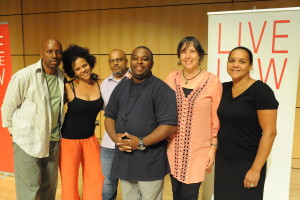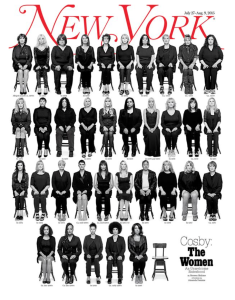New 7/28 Episode: NO LAWYERS ALLOWED
In 1963, the U.S. Supreme Court ruled that states must provide an attorney for people who can’t afford one. The case, Gideon v. Wainwright, changed how criminal courts work. The right to an attorney became enshrined in our national consciousness alongside life, liberty and the pursuit of happiness.
It’s a nice concept.
But in fact there are many ways people charged with an offense end up confronting those charges and the legal system alone. At disciplinary hearings behind prison walls, inmates are not guaranteed the right to an attorney. In fact, they aren’t allowed to have an attorney represent them at the hearing.
In this first of a series on what happens in the absence of lawyers, Life of the Lawreporter Alisa Roth takes us to a prison disciplinary hearing, where no lawyers are allowed.
![]()
SCOTUS: But I didn’t mean to…
The summer of 2016 may well be remembered not so much for the fireworks in July, as for the historic decisions handed down by the U.S. Supreme Court in June.
There was the 5-4 decision on June 26th in Obergefell v Hodges that struck down laws prohibiting same-sex marriage. On SCOTUSblog, legal scholar, Erwin Chemerinsky wrote, “June 26, 2015 thus will be remembered, like dates such as May 17, 1954, when the Court decided Brown v. Board of Education, as the Court taking a historic step forward in advancing liberty and equality. And I have no doubt,” Chemerinsky writes, “that history will regard Obergefell, like Brown as a decision that was clearly right and that was an important advance to creating a more equal society.”
While some cities and towns throughout the country are vying for the opportunity to be considered the new destination for same sex weddings, others in the national community are trying to hold back time. On July 28th, a Tennessee lawmaker reportedly sent a letter to all 95 county clerks in his state encouraging them to refuse to issue marriage licenses to same sex couples.
And then there was the June 25, 6-3 decision in King v. Burwell, in which the US Supreme Court upheld the Affordable Care Act, ruling that those who get their health insurance through an exchange established by the federal government will continue to be eligible for tax subsidies. It was a victory for the Obama Administration and for the Affordable Care Act. Had the Court ruled the other way, more than 8 million Americans would have been adversely impacted.
But, in a much less-publicized 5-4 SCOTUS decision released the same day, the Court considered the idea of disparate impact. Disparate impact sounds wonky — but it’s basically the concept that a state or federal policy can still be discriminatory, even if government agencies and officials say they didn’t mean it to be discriminatory. InTexas Department of Housing and Community Affairs v. The Inclusive Communities Project, a nonprofit in Texas argued that the state’s housing agency was rejecting too many tax credits for low-income housing in Dallas’s white suburbs, and instead the agency was crowding low-income developments into black and Latino neighborhoods. The case wasn’t about whether Texas meant to discriminate. The plaintiffs just said the agency’s way of doing things had an unjustified effect on blacks and Latinos.
In this week’s special segment, Baltimore based reporter Lawrence Lanahan brings us this story in our series on this most recent round of Supreme Court rulings.
![]()
Reporter’s Notebook: Alisa Roth
It’s a bit of a mystery how a story takes shape. I bet you’re wondering how this week’s Life of the Law episode, “No Lawyers Allowed” came together. Life of the Law’s intern, Kirsten Jusewicz-Haidle spoke with reporter Alisa Roth, who shared her secrets.
I’m intrigued by disciplinary hearings because they can have such a tremendous effect on peoples’ lives. How a hearing turns out can determine whether a prisoner will be allowed privileges like visits and access to commissary, or not. But ultimately, they can also determine how long a person will stay in prison. Among other reasons, disciplinary records are one of the things parole boards consider when they decide whether to let somebody out of prison, or not. That’s a lot to have riding on a hearing where you have to represent yourself.
And as a radio reporter I’m always looking for stories that have possibilities for interesting use of sound. So I was very excited when I found out that the disciplinary hearings are all recorded.
Alisa: This is obviously a really serious story. But there was a funny aspect to it, which was dealing with old technology. I don’t know if they still are, but when Derrick was in prison, the hearings were all recorded on cassette tapes. So I got the tapes from him, but I couldn’t play them. A neighbor of mine still has an old Walkman, but it turned out to be broken. Then I actually discovered that the drugstore still sells portable cassette players—why?! But after spending what seemed like way too much money, that one didn’t work either. I finally found a working boom box at my parents’ house, but I had to rig up a bunch of cables to connect it to my recorder so I could digitize them.
I’m probably dating myself here, but I’d forgotten how hissy cassette recordings are and how annoying it is not to be able to tell exactly where on a tape something is. Oh, and that very distinctive click it makes when you push the stop button.
Note: Coming up in Life of the Law’s fall season, Alisa Roth’s second episode in our series on the absence of attorneys.
![]()
LIVE LAW Rocked Baltimore
On July 20th, Life of the Law’s producers joined Soros Justice Fellows from around the country at the Lewis African American History Museum in Baltimore for a night of storytelling about the law in our lives. The theme was “Two Baltimores.”
The six captivating stories challenged each and everyone in the theater to think about their perceptions of the law and its cause and effect relationship to justice and injustice in America. There were gasps and standing ovations. We look forward to sharing these stories in our LIVE LAW series of podcasts. Stay tuned.
![]()
What We’re Reading: New York Magazine’s Bill Cosby Story
For several months, women across the country have been telling journalists stories about how they were abused by comedian and actor, Bill Cosby. At first it was one woman, then two, then another. The accounts by more than 40 women, former Playboy bunnies, one-time waitresses and professional journalists accused Cosby of abuses ranging from rape to molestation. Like a cascade, with each new story, another woman has come forward to say they too were abused by Cosby.
While many of the women have filed defamation lawsuits against Cosby claiming he falsely branded them as liars for accusing him of sexual assault, at least four civil lawsuits are pending and one suit by a woman who claims she was 15 at the time of the alleged offense is seeking damages for sexual misconduct. The California Supreme Court recently ruled the litigation by Judith Huth can proceed. Cosby and his attorneys have consistently denied all allegations of sexual misconduct. Gloria Allred, Huth’s attorney, has been reported as saying she is looking forward to Mr. Cosby answering questions under oath at his deposition.
Until yesterday the women told their stories separately, as individuals. On July 27th, New York Magazine changed that.
![]()
Stay tuned for next week’s LIVE LAW story: Skatepark
![]()
“The power of the lawyer is in the uncertainty of the law.”
― Jeremy Bentham












